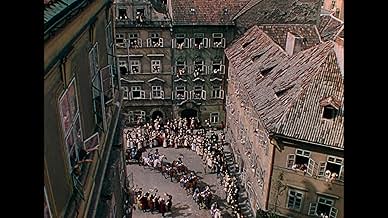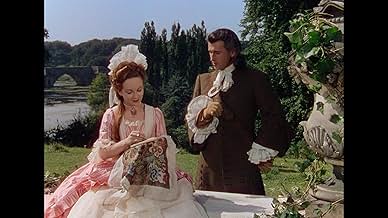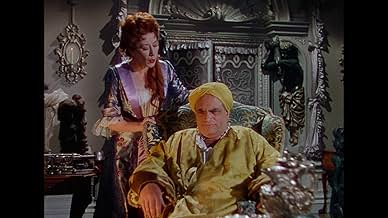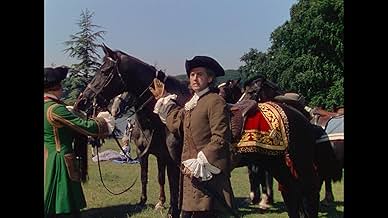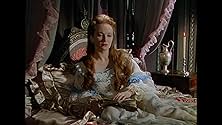Young Sophie Dorothea marries Prince George Louis but it's far from a love match. Then she falls for Swedish Count Philip Christoph von Königsmark.Young Sophie Dorothea marries Prince George Louis but it's far from a love match. Then she falls for Swedish Count Philip Christoph von Königsmark.Young Sophie Dorothea marries Prince George Louis but it's far from a love match. Then she falls for Swedish Count Philip Christoph von Königsmark.
- Nominated for 1 Oscar
- 1 win & 2 nominations total
Françoise Rosay
- The Electress Sophia
- (as Francoise Rosay)
6.5744
1
2
3
4
5
6
7
8
9
10
Featured reviews
Truly Stunning Forties Melodrama
This is one of the most beautifully made Technicolor melodramas of the 1940's which loses nothing in maintaining historical accuracy. Look out for simply stunning performances from Peter Bull as the heir presumptive to the British throne and, above all, Flora Robson as Countess Platen. Stewart Granger (Konigsmark) is in top form and Francoise Rosay as the Electress Sophia is unforgettable. Dialogue is razor sharp throughout, the costumes are splendidly authentic and the sets are magnificent. The only area of weakness is Joan Greenwood's Sophie Dorothea, but she is supposed to be playing a tragic victim and maybe that's why critics wrote her off as a wet lettuce. It is much to be regretted that Saraband is not more widely available.
Why so poorly rated? This is an absolute gem!
With most of the reviews here rating the film at 8 and above, the overall score of 6.6 seems to indicate an unreasonable bias in favour of the sort of reviewer who thinks that 'cack' is a useful characterisation of this masterwork, or who superciliously thinks that perhaps film students could just admire the brief technical mastery of the montage sequence - which is indeed brilliant editing - but who then dismissively junks the rest of the film.
Actually, most of the reviewers here actually do ample justice to a production which excels in all departments, and succeeds in being a romantic film which balances passion with such intelligence that a powerful and moving tragic sense is conveyed of real people trapped in a world of inhuman artifice and formality. I think Dearden's work here has a powerful impact that is at least the equal of David Lean's later epics. It also often even reminded me of the sad fate of Kubrick's Barry Lyndon, like Koenigsmarck the commoner victim of a cruel aristocratic world, the reality of which is portrayed without illusions.
So why the poor overall rating? This really can't be justified, or tolerated, and I must be particularly lavish in my praise to help raise it up towards something nearer to it's true worth.
Once again, here in Britain, it was only thanks to the ever-excellent 'Talking Pictures TV' that we got a chance to see this neglected masterpiece at all. Really the general churlishness of modern neglect towards this utterly magnificent film is very hard to fathom.
Perhaps it is merely the jealousy of mediocrities who can never hope to grasp or emulate such an intelligent movie, in which the historical background is correctly but lightly established, or to command such a superbly well-constructed portrait of passion and intrigue in high places. In Britiain we seem to have developed an aversion to a past so often sweepingly dismissed as both hopelessly outmoded, as well as politically irredeemable, by an influential cultural cabal that wants to sweep away the inconveniently substantial achievements of earlier generations, which they find so uncongenial to their own doctrinaire, yet strangely insecure and intolerant ideals.
Objectively, the direction, screenplay, acting, costumes, set, camera-work and general mise-en-scene are of an uniformly high standard. Only a philistine, or a doctrinaire but shallow cineaste who feels threatened by having the grand achievements of his parent's and grandparent's generations, as it were, looking over his shoulder, could possibly dismiss such a magnificent and effective film. Some fellow-travellers of both regrettable tendencies seem to be sitting in judgement of this fine film here, but not enough of them to relegate it to a miserable 6.6, surely?
Actually, most of the reviewers here actually do ample justice to a production which excels in all departments, and succeeds in being a romantic film which balances passion with such intelligence that a powerful and moving tragic sense is conveyed of real people trapped in a world of inhuman artifice and formality. I think Dearden's work here has a powerful impact that is at least the equal of David Lean's later epics. It also often even reminded me of the sad fate of Kubrick's Barry Lyndon, like Koenigsmarck the commoner victim of a cruel aristocratic world, the reality of which is portrayed without illusions.
So why the poor overall rating? This really can't be justified, or tolerated, and I must be particularly lavish in my praise to help raise it up towards something nearer to it's true worth.
Once again, here in Britain, it was only thanks to the ever-excellent 'Talking Pictures TV' that we got a chance to see this neglected masterpiece at all. Really the general churlishness of modern neglect towards this utterly magnificent film is very hard to fathom.
Perhaps it is merely the jealousy of mediocrities who can never hope to grasp or emulate such an intelligent movie, in which the historical background is correctly but lightly established, or to command such a superbly well-constructed portrait of passion and intrigue in high places. In Britiain we seem to have developed an aversion to a past so often sweepingly dismissed as both hopelessly outmoded, as well as politically irredeemable, by an influential cultural cabal that wants to sweep away the inconveniently substantial achievements of earlier generations, which they find so uncongenial to their own doctrinaire, yet strangely insecure and intolerant ideals.
Objectively, the direction, screenplay, acting, costumes, set, camera-work and general mise-en-scene are of an uniformly high standard. Only a philistine, or a doctrinaire but shallow cineaste who feels threatened by having the grand achievements of his parent's and grandparent's generations, as it were, looking over his shoulder, could possibly dismiss such a magnificent and effective film. Some fellow-travellers of both regrettable tendencies seem to be sitting in judgement of this fine film here, but not enough of them to relegate it to a miserable 6.6, surely?
Look for the Well-Executed Montage Sequence
This is the type of film that shows how one can find interesting small moments in an otherwise rather average film. Buried in the middle of this film is a five minute beautiful example of a montage by rhythm as Joan Greenwood tries to make her way through a chaotic masque ball in order to meet her lover. The sequence climaxes with a series of flash pans and POV shots as we are thrust into the center of the action with the character. The filmmaker inserts fast POV shots of close ups of the masked revelers. The cuts and flash pans are edited rhythmically with the music and make for a wonderful example of a well-executed montage sequence. Show just this sequence to film students.
10mp-peled
Excellent
Long before the film was made, I read the book it is based on, namely Konigsmark by A.E.W.Mason. I found the book enthralling and was more than eager to see the film, which turned out to be equally magical, exciting and romantic. To my mind the actors were superbly cast and the sets and costumes so beautifully designed that I felt I was living the events myself and the book and the historical period came vividly to life. I do hope that copies of the film have not been lost and that one day it will reappear perhaps in a remastered form. It is one of the gems of forties' British film-making and deserves to be seen by a present-day audience.
a gem of British cinema
Terrific performances, excellent production values and superb color cinematography highlight this tale of court intrigue, forbidden love and murder. Saraband for Dead Lovers was mentioned by Stewart Granger as one of the few films of his that he was truly proud of, and it's plain to see why. He is terrific as Count Konigsmark, inventor of the famous Colichemarde sword that bears a version of his name, though that isn't even mentioned here. Flora Robson does a great job with a particularly juicy character reminiscent of Glenn Close's character in Dangerous Liasons. In fact, if you liked that film, you'll probably love this one. All the supporting cast are very good, especially Peter Bull and Anthony Quayle. Please someone restore this film and put it out on DVD. Kino? Anyone??
Did you know
- TriviaThis was the first Ealing Studios movie to be shot in colour.
- Quotes
Konigsmark: There are four of us. My sisters have been liberal with their favours in half the courts of Europe. My brother was tried for murder in England. As for me, I'm no better than the others. There's something in our blood that makes us worthless... for anyone one.
- Crazy creditsClosing credits epilogue: SOPHIE DOROTHEA
BORN AT CELLE..... SEPTEMBER 15TH. 1666
WIFE OF KING GEORGE 1 of ENGLAND
and MOTHER OF KING GEORGE 11
DIED AT AHLDEN....NOVEMBER 13TH. 1726
- ConnectionsReferenced in Introducing Ealing Studios (2012)
- How long is Saraband?Powered by Alexa
Details
- Release date
- Country of origin
- Language
- Also known as
- Pesma mrtvim ljubavnicima
- Filming locations
- Blenheim Palace, Woodstock, Oxfordshire, England, UK(Park exteriors)
- Production company
- See more company credits at IMDbPro
- Runtime
- 1h 36m(96 min)
- Color
- Aspect ratio
- 1.37 : 1
Contribute to this page
Suggest an edit or add missing content

